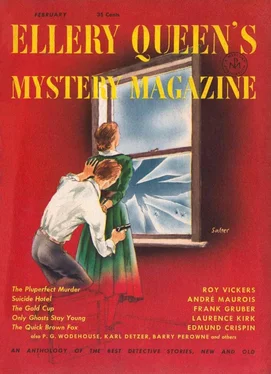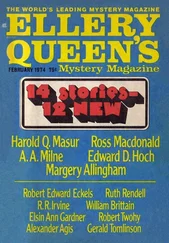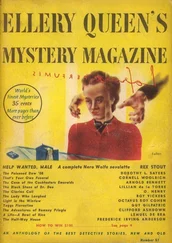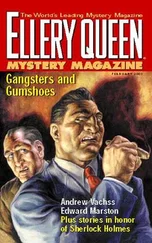E. Ashton - Ellery Queen’s Mystery Magazine. Vol. 19, No. 99, February 1952
Здесь есть возможность читать онлайн «E. Ashton - Ellery Queen’s Mystery Magazine. Vol. 19, No. 99, February 1952» весь текст электронной книги совершенно бесплатно (целиком полную версию без сокращений). В некоторых случаях можно слушать аудио, скачать через торрент в формате fb2 и присутствует краткое содержание. Город: New York, Год выпуска: 1952, Издательство: American Mercury, Жанр: Детектив, на английском языке. Описание произведения, (предисловие) а так же отзывы посетителей доступны на портале библиотеки ЛибКат.
- Название:Ellery Queen’s Mystery Magazine. Vol. 19, No. 99, February 1952
- Автор:
- Издательство:American Mercury
- Жанр:
- Год:1952
- Город:New York
- ISBN:нет данных
- Рейтинг книги:4 / 5. Голосов: 1
-
Избранное:Добавить в избранное
- Отзывы:
-
Ваша оценка:
- 80
- 1
- 2
- 3
- 4
- 5
Ellery Queen’s Mystery Magazine. Vol. 19, No. 99, February 1952: краткое содержание, описание и аннотация
Предлагаем к чтению аннотацию, описание, краткое содержание или предисловие (зависит от того, что написал сам автор книги «Ellery Queen’s Mystery Magazine. Vol. 19, No. 99, February 1952»). Если вы не нашли необходимую информацию о книге — напишите в комментариях, мы постараемся отыскать её.
Ellery Queen’s Mystery Magazine. Vol. 19, No. 99, February 1952 — читать онлайн бесплатно полную книгу (весь текст) целиком
Ниже представлен текст книги, разбитый по страницам. Система сохранения места последней прочитанной страницы, позволяет с удобством читать онлайн бесплатно книгу «Ellery Queen’s Mystery Magazine. Vol. 19, No. 99, February 1952», без необходимости каждый раз заново искать на чём Вы остановились. Поставьте закладку, и сможете в любой момент перейти на страницу, на которой закончили чтение.
Интервал:
Закладка:
They had remained in the ducal service until their mutton-chop whiskers had grown as grey as their hats, when a turf miscalculation at Ascot and a baccarat catastrophe at Homburg had obliged the Duke to curtail his stables. Much of his bloodstock, auctioned at Tattersall’s, had been bought en bloc.
“By order,” said Benjamin, J., with a discreet cough as he fingered his watch-chain, “of a reigning monarch.”
The fraternal coachmen had accompanied the horses on their journey abroad to the imperial stables, where the two diminutive, dignified men had made such a favourable impression that it had been intimated to the Duke that it would be convenient if he released them to the imperial service.
Settling down in the magnificence of the foreign capital, the brothers had lodged together near the palace stables; and, as seems to happen by a kind of fate to small men with mutton-chop whiskers and severe upper lips, both had conceived a passion for a bosomy blonde widow — their landlady.
“We fell out,” Mr. Benjamin told us, patting his dog’s head laid in sympathy on his knee, “over Emmy.”
For a year and more they had been at daggers drawn — until suddenly the capricious widow had bundled them both out of the house and married an interloping farrier-sergeant.
“You’d ’ave thought this would ’ave ’ealed the breach,” said, Mr. Benjamin, “but not a bit of it. No, gentlemen. We blamed it on each other, and it rankled.”
Matters had come to a head in a strange way. Late one snowy night, a landau had been ordered to report to a side door of the palace to take a passenger to the station to catch the St. Petersburg express. Benjamin, J., being on duty, had reported with the landau accordingly, and two men — one a civilian in a heavy black overcoat and black felt hat, wearing pince-nez and carrying a dispatch-case, the other a squat, thickset officer in spiked helmet and military cloak, known to Mr. Benjamin as Colonel Saxe — had emerged quickly from the side door of the palace. Colonel Saxe had told the coachman to wait a minute, there was a third person to come; and both men had ducked into the landau.
“The night was still,” said Mr. Benjamin. “Just the flakes comin’ down thick, an’ sizzlin’ on the ’ot brass of the coach-lamps, an’ the ’osses givin’ a thump an’ jingle now an’ then. The gentlemen seemed excited an’ pleased with theirselves. They was talkin’ away inside the landau while we waited. I’d been takin’ lessons in the language from Emmy for a year, nigh on, to inwaygle myself. I could ’ear every word the gentlemen said, an’ I could understand about ’alf of it.”
What he had heard and understood had made Mr. Benjamin’s stock feel tight about his throat, and his heart thump sultry, as he sat there on the box, a rug over his knees, the flakes whirling grey in the wan shine of the coach-lamps.
“You see, sirs,” said Mr. Benjamin, “I’m English born — native of Seven-oaks — an’ what I ’eard didn’t bode no good to them at ’ome, an’ I felt it ought to be knowed of in London.”
So when the third person had emerged from the palace and ducked into the landau, and Mr. Benjamin had driven through the wide, deserted, snowy streets to the station, then back again — the Russian gentleman with pince-nez having been seen off on the St. Petersburg express — to set down the other two at the palace, Mr. Benjamin had gone on to the stables, put up his horses, and walked off through the night and the snow to the British Embassy.
“They listens to my story,” said Mr. Benjamin, “then they ses, ‘You’re goin’ to London, Mr. Benjamin, an’ you’re goin’ quick an’ secret.’ So I ses, ‘What about Benjamin, T.?’ There was no love lost between us, sirs, not since Emmy. Still, I didn’t ’ate ’im, not the way ’e ’ated me. An’ when it got out where the leak come from, I didn’t relish the thought of their takin’ it out on ’im — bein’ my brother, all said and done. The Embassy gent ses, ‘Don’t worry about ’im,’ he ses. ‘We’ll give ’im the tip an’ do as much for ’im as we’re doin’ for you. ’E won’t be to London far be’ind you.’ ”
“They have ways and means,” Raffles had murmured.
“Yessir,” said Mr. Benjamin. “All the same, I bin back two years now, come Hallowe’en, an’ ain’t never ’eard a word from ’im from that day to this!”
“What happened?” Raffles had said, frowning.
“All I know,” said Mr. Benjamin, “when I got back an’ told my story to various official gentlemen, they was uncommon put out by it, but they ses, ‘You done right an’ proper, Mr. Benjamin, an’ we’ll block that little manoeuvre of ’Is Imperial Majesty ’ere an’ now,’ they ses. An’ I reckon they done it, they was that vexed. What’s more, they must’ve mentioned your ’umble servant to the Queen ’erself, for the next I know — God bless ’er — I’m awarded a pension an’ a lifelong tenancy of one of the Queen’s Grace and Favour ’ouses, in ’Er Majesty’s personal gift.”
“And you’ve never heard from your brother at all?” Raffles had said.
“No, sir. I was told the Embassy done like they promised, an’ warned him an’ offered to get ’im ’ome. But no,” said Mr. Benjamin, “ ’e refused. ’E said ’e wouldn’t stoop to soil ’is ’ands with any doings of mine. ’E was like that, sir — after Emmy. Fair ’ated me, ’e did. Anything I done, that was wrong — an’ ’ e ’ad to do the opposite. ‘Let ’im go,’ he ses, ‘I’m stayin’ where I am.’ An’ ’e stayed. But I’ve often wondered whatever become of ’im,” Mr. Benjamin had said, shaking his head, his blue eyes guileless under his bang. “ ’Is Imperial Majesty was never one to take an injury without somebody payin’ for it.”
I thought of that grey, rigid face of hauteur I had seen today in the Mall — and I looked searchingly, now, at Raffles, in the dim light from the baker’s window.
“Yes,” I said, “Mr. Benjamin is a particular friend of mine. I’ve often talked to him at Florian’s, since that night he told us about himself.”
“Did he ever mention Colonel Saxe again?” said Raffles.
“Colonel Saxe?” I said. “No. Why?”
“I just wondered,” Raffles said. “You know Mr. Benjamin’s address?”
“Yes. It’s a stone’s throw from here,” I said. “But, Raffles, what made you come looking for him tonight, particularly?”
“Just a fancy,” he said. “I’ve been in the Mall today—”
I snapped my fingers. “I knew it!”
“Some pretty baubles, Bunny,” he said, chuckling.
“And your fingers itched,” I said, “particularly when His Imperial Majesty rode past, scorning everybody and everything! That’s what made you think of Mr. Benjamin?”
“I had a fancy,” said Raffles, “to hear him ramble and reminisce. These ex-royal servants know a lot about the habits of the exalted.”
I drew in my breath. “Raffles,” I whispered, “whatever you’re planning, I’m with you!”
He threw an arm delightedly about my shoulders. “Had enough of the sheepfold, Bunny? Good man! Welcome home to the wolf lair! Not,” he added, “that I’m planning anything. Just sniffing the air, eh? These purple midsummer nights, Bunny, with a hint of thunder in them — they make one tingle. A night of kings and diamonds!”
A thrill fled up my spine. “Let’s take the dog home,” I said. “The old man’s probably missed him. He’ll be so relieved, he’ll certainly ask us in. You can talk to him. Come on!”
We passed up a dark alley which brought us out opposite Knightsbridge Barracks, where in rooms yellow-lit behind rows of barred windows redcoats moved with glint of steel and gleam of brass, preparing to mount guard over the crowned heads of Europe. Nearby, on the side of the street on which we stood, was the dim little entrance of Florian’s. Further down, to the right and on the opposite side, a bracket-lamp burned on the arch above the entrance to a courtyard.
Читать дальшеИнтервал:
Закладка:
Похожие книги на «Ellery Queen’s Mystery Magazine. Vol. 19, No. 99, February 1952»
Представляем Вашему вниманию похожие книги на «Ellery Queen’s Mystery Magazine. Vol. 19, No. 99, February 1952» списком для выбора. Мы отобрали схожую по названию и смыслу литературу в надежде предоставить читателям больше вариантов отыскать новые, интересные, ещё непрочитанные произведения.
Обсуждение, отзывы о книге «Ellery Queen’s Mystery Magazine. Vol. 19, No. 99, February 1952» и просто собственные мнения читателей. Оставьте ваши комментарии, напишите, что Вы думаете о произведении, его смысле или главных героях. Укажите что конкретно понравилось, а что нет, и почему Вы так считаете.












